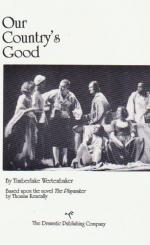|
This section contains 614 words (approx. 2 pages at 400 words per page) |

|
Our Country's Good Summary & Study Guide Description
Our Country's Good Summary & Study Guide includes comprehensive information and analysis to help you understand the book. This study guide contains the following sections:
This detailed literature summary also contains Quotes and a Free Quiz on Our Country's Good by Timberlake Wertenbaker.
The following version of this book was used to create this study guide: Wertenbaker, Timberlake. Our Country’s Good. Dramatic Publishing Company, 1988.
The story is told in a series of short scenes within two acts. Each scene has its own title. Notes suggest that the large cast of characters is played by a company of twelve actors, seven men and five women. Each actor plays a number of different parts, with the decision of which actor plays which part being to the play’s director, and to each individual production.
The play begins with the prologue-like Scene One, in which poetic musings on the situation of the convicts are juxtaposed with the image of one convict being whipped. There is then a similarly prologue-like, similarly poetic Scene Two, in which an Australian indigenous citizen (referred to as “The Aborigine”) briefly describes the arrival of the ship. The action of the play begins as the military officers controlling the colony of prisoners and the sailors manning the ship that transported them debate the merits of punishment vs. the merits of rehabilitation. One of the officers, the young and ambitious Lieutenant Clark, is put in charge of producing a play which, the colony’s liberal-minded governor suggests, will be a positive step in awakening the convicts to a new way of thinking about themselves and about the world.
Clark auditions several of the convicts for roles in the play he has chosen, “The Recruiting Officer” by George Farquhar. Those convicts include the shy Mary Brenham and her friend, the talkative Dabby Bryant. There is also the self-important Sideway, the educated Wisehammer, the child-like Duckling Smith, and the rough-hewn John Arscott. Their work is monitored and opposed by the hard-nosed Major Ross, the intellectual Governor Phillip, and the practical Captain Tench.
As he struggles to connect with the convicts, Clark also struggles with his longings for home, and for his beloved Alicia. His situation is made even more difficult by his friendship with Harry Brewer, a sailor on the ship that brought the convicts to Australia. Brewer asks Clark for help dealing with his dreams, dreams haunted by images and voices of prisoners who were executed because of him. Clark is unable to be of much help, and Brewer continues carrying his troubles into his possessive, controlling relationship with Duckling Smith. Meanwhile, another of the convict-actors, the hard and angry Liz, is accused along with Arscott and Wisehammer of being involved in the theft of food from the supply building. Just as Clark’s rehearsals are starting to gain momentum, Liz and the others are arrested, putting the performance in jeopardy.
Act Two begins with Liz and the others awaiting their execution. Meanwhile, rehearsals continue, with Clark and Mary Brenham beginning to develop feelings for each other. Brewer becomes increasingly ill, and eventually dies, leaving Duckling to survive on her own. Clark and Mary eventually have a sexual encounter. Liz reveals the truth of what happened on the night of the theft, convincing the Governor over Ross’s objections that she is innocent. When the Governor wishes her well in the performance, she speaks to him in the language of the play, and says that she will do her best.
In the final scene, the convict-actors are getting ready for their first performance. Wisehammer reads a prologue for the play that he has written. The other convict-actors, say that Wisehammer’s prologue tells their truth, but Clark says it is too dangerously political, and cannot be performed. He and Mary also have a quiet moment in which they make plans for a future and a family. The play ends with the performance beginning.
Read more from the Study Guide
|
This section contains 614 words (approx. 2 pages at 400 words per page) |

|



